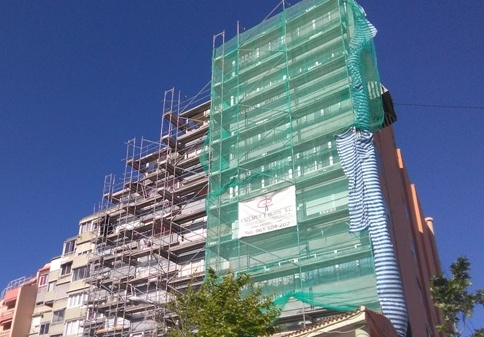
26 Aug WHAT WORKS CAN WE DO IN OUR COMMUNITIES OF OWNERS
WHAT WORKS CAN WE DO IN OUR COMMUNITIES OF OWNERS
I want to revitalise my Community of Owners and as the owner, I don’t know what I can do or not do. If allowed, how far can I go in repairing, refurbishing, reforming or even just making improvements? Or what if the works affect only my own home, or if they affect the rest of the community?
This is the most common question that is asked of us: we want to do some work in our place of residence, and we do not want problems with the Community of Owners. We already know that in the Communities of Owners there is a great diversity of people with their own opinions, beliefs, norms, etc. as in life itself and that coexistence always creates tension and conflict. And you may want to do something that may cause stress. This is why to avoid problems with neighbours, it is preferable to know what can and cannot be done. In this blog, with the world of construction being our company’s field of expertise, we will try to alleviate some of these doubts or at least give a couple of useful tips.
What questions can be asked or what actions are the most common in terms of work in a Community of Owners.
1. Install an elevator in my community.
2. A neighbour can be denied works in communal areas or even works within their own home.
3. I want to close my terrace.
4. Leaking repair in private attics.
5. Works to improve, repair or maintain the community.
Let’s delve into each topic in more detail:
1. Install an elevator in my community
This is a significant expense, and like many things where money is involved, it can cause big disagreements. There are those who want it, those who need it and those who don’t need it and don’t want the expense of it. There are rules and laws where the installation of an elevator is required, for example, when requested by people over 60 years of age or with a disability.
Although there are some limitations in this regard:
– Provided that the cost of the work does not exceed 12 monthly installments of the owners.
– And if it is greater than 12 monthly payments it will be necessary to have the approval of the majority of neighbours.
– Even so and if the vote is negative, the applicants could still carry out the works if they are willing to completely assume the expense.
2. A neighbour can be denied works in community areas or even works within their own home.
The repair and maintenance of common elements (general downspouts, sewerage, facade works) are mandatory for all neighbours, and it is the obligation of every owner to preserve the homes. In cases where access to the site of the repair is within the a person’s house, the owner or tenant is obliged to facilitate access to it.
3. Closing a terrace.
When closing terraces, the total surface is being modified, and is therefore regulated by town planning regulations and will require a permit or license from the relevant city council. At the same time, the Horizontal Property Law allows terraces and balconies of entire buildings to be closed if energy efficiency is improved by 30%, and with the support of 3/5 of the neighbors. For a single owner who wants to close a terrace, he/she must ask for approval at the meeting. If denied, and there had been a precedent set by other neighbors who have carried out the same reform, it could be brought to court because it could be considered a comparative grievance.
4. Repair to leaks in private attics.
The roof is a community element, although its use can be private as a terrace. The attic owner has this proprietary use and performs general maintenance. In the case of leaks and dampness, the origin of the problem must be evaluated by a competent expert to determine if it is due to the natural deterioration of the waterproofing system, so the community will take care of this repair. If this is not the case and it is determined that it is due to misuse or neglect of maintenance by the owner, he/she will be liable for the repairs.
5. Works to improve, repair or maintain the community.
It is not the same to repair a faulty sanitation system as to buy planters, decorative lamps or build a paddle tennis court, a springboard for the pool, etc. The first is essential work and all owners are obliged to pay. The latter are improvements and if their cost adds up to three ordinary monthly payments of common expenses, those who are not satisfied can refuse to pay.
In future blogs we will continue trying to help in the world of the Communities of Owners and their works. Take this opportunity to remember that Esclapés e Hijos S.L. is a leading construction company in the Province of Alicante, with vast experience in various sectors of construction such as industrial, public and private works, for Communities of Owners and individual clients, in civil works and infrastructure, in building, refurbishment and housing and business reform for commercial and business activities. We have successfully carried out jobs entrusted to us for more than 20 years.
